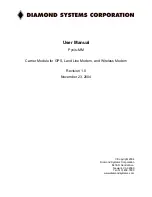
7
WARNING! PLEASE READ AND FOLLOW
THESE INSTRUCTIONS TO
AVOID
PERSONAL INJURY OR DEATH:
When working on or around a vehicle, the following
general precautions should be observed at all times.
1.
Park the vehicle on a level surface, apply the
parking brakes, and always block the wheels.
Always wear safety glasses.
2.
Stop the engine and remove ignition key when
working under or around the vehicle. When
working in the engine compartment, the engine
should be shut off and the ignition key should be
removed. Where circumstances require that the
engine be in operation, EXTREME CAUTION should
be used to prevent personal injury resulting from
contact with moving, rotating, leaking, heated or
electrically charged components.
3.
Do not attempt to install, remove, disassemble or
assemble a component until you have read and
thoroughly understand the recommended
procedures. Use only the proper tools and observe
all precautions pertaining to use of those tools.
4.
If the work is being performed on the vehicle’s air
brake system, or any auxiliary pressurized air
systems, make certain to drain the air pressure from
all reservoirs before beginning ANY work on the
vehicle. If the vehicle is equipped with an AD-IS
™
air dryer system or a dryer reservoir module, be
sure to drain the purge reservoir.
5.
Following the vehicle manufacturer’s
recommended procedures, deactivate the electrical
system in a manner that safely removes all
electrical power from the vehicle.
6.
Never exceed manufacturer’s recommended
pressures.
7.
Never connect or disconnect a hose or line
containing pressure; it may whip. Never remove a
component or plug unless you are certain all
system pressure has been depleted.
8.
Use only genuine Bendix
®
replacement parts,
components and kits. Replacement hardware,
tubing, hose, fittings, etc. must be of equivalent
size, type and strength as original equipment and
be designed specifically for such applications and
systems.
9.
Components with stripped threads or damaged
parts should be replaced rather than repaired. Do
not attempt repairs requiring machining or welding
unless specifically stated and approved by the
vehicle and component manufacturer.
10. Prior to returning the vehicle to service, make
certain all components and systems are restored
to their proper operating condition.
11. For vehicles with Antilock Traction Control (ATC),
the ATC function must be disabled (ATC indicator
lamp should be ON) prior to performing any vehicle
maintenance where one or more wheels on a drive
axle are lifted off the ground and moving.
OPERATION & LEAKAGE TESTS
GENERAL
A change in vehicle braking characteristics or a low pressure
warning may indicate a malfunction in one or the other brake
circuit, and although the vehicle air brake system may
continue to function, the vehicle should not be operated
until the necessary repairs have been made and both
braking circuits, including the pneumatic and mechanical
devices are operating normally. Always check the vehicle
brake system for proper operation after performing brake
work and before returning the vehicle to service.
To properly test the function of the ATR-2
™
valve, a pair of
test gauges or gauges of known accuracy must be used.
OPERATION TEST
1. Drain air pressure from all vehicle reservoirs.
FIGURE 11 - TRACTION CONTROL BRAKE APPLICATION
CONTROLLER
BRAKE
VALVE
CHECK VALVE
RELAY PISTON
INLET EXHAUST
REAR AXLE
RESERVOIR
TRAILER SUPPLY
PROP. PISTON
TRACTION
SOLENOID
INLET EXHAUST
SERVICE BRAKE
MODULATOR






























